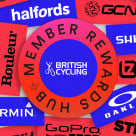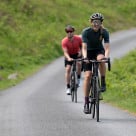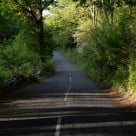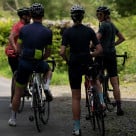Great Britain Cycling Team’s David Smith says he is determined to make the most of the final leg of the UCI Para-cycling Road World Cup in South Africa.
A 13-strong team will compete at Pietermaritzburg from 11-13 September in the last event on the para-cycling world stage in 2015.
With less than a year to go to the start of the Paralympics in Rio de Janeiro, Smith says it’s a huge competition for both him and the team.
“It’s a massive one for me. It’s my second one back since surgery; the first one in Maniago (in Italy) was a real jump into the deep end.
“For this one, I’ve had a real good block of training so it’s a pretty crucial competition for everyone but especially for myself to go out and see where I am and see how much more work I need to do.”
“People always ask you about Rio and this is a really important stepping stone in that process. It's a year to go, but it's such a long way away on performance that I'm not really thinking too much about it, I'm just trying to focus on the processes every day. (Pietermaritzburg) will be a real good benchmark to see where I am and know exactly what we need to do to move forward.”
Smith admits that his Paralympic dream is a big challenge, but overcoming adversity is second nature to the 37-year-old.
Gold at the Games
In 2010, Smith was part of Great Britain’s Paralympic rowing squad, training for a place at London 2012, when he was diagnosed with a rare tumour on his spinal column.
He underwent life-threatening surgery twice before battling back to regain his fitness to make the start-line for the 2012 Paralympic Games, culminating in a gold medal in the mixed coxed four.
Despite his success in the boat, the aftermath of his surgery meant that Smith needed to retire from rowing.
After getting back on his bike as part of his rehab for 2012, his competitive spirit led to a move to cycling. Then, last year, he received the news he’d been dreading: the tumour had returned and he faced surgery once more.
“I realised what it's like to lose everything. I realised what it's like to sit in a room and for someone to tell you that you might die and then to actually get on to an anaesthetic table, feel the anaesthetic go in, close your eyes not knowing that you'll ever open them again and that's a pretty scary place to be.”
Smith was told he had a one in 500 chance of survival, that he could be paralysed from the neck down, that he could lose both lungs or function in both of his hands and that even if the surgery was a success, there was a 68% chance the tumour would return.
His surgeon told him his cycling career was over. But David Smith does not like hearing the word ‘no’.
The surgery was a success and as he recovered, his thoughts turned to Rio and getting back on his bike.
He set himself the goal of riding up the formidable Mont Ventoux to show that he could compete again. When a friend told him he couldn’t do it, he proved him wrong: by reaching the summit three times in a single day.
Now, his focus is firmly on representing Great Britain in South Africa in the world cup.
“Sport means so much to me. It's saved my life on three occasions now. It gives me something. I'm very fortunate as I get to live a passion so I've always said that any time that you pull on your national top, it's a proud thing to be a part of.
“What I've learned, especially through my last surgery, is that I came close to losing it all. I realised how precious it is to pull on that jersey and how sometimes we can all take it for granted.
“You've got to suffer. Every time you sit on the bike you suffer, but for me the pain that I feel on the bike is such a nicer pain that what it felt to be lying in a hospital bed not knowing if you'd ever walk or even live, so if any time I think I’m having a hard day or maybe think there's something easier to do, I think back to that moment.
“Every time I pull on a British top to cycle, I know with my continued scans and the fact that my tumour is still in there, it's something that could very easily be taken away from me.
“So for me, it's very important and it's something I don't take for granted and really treasure.”




